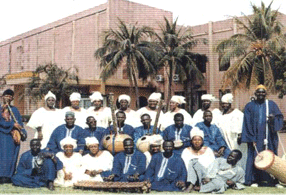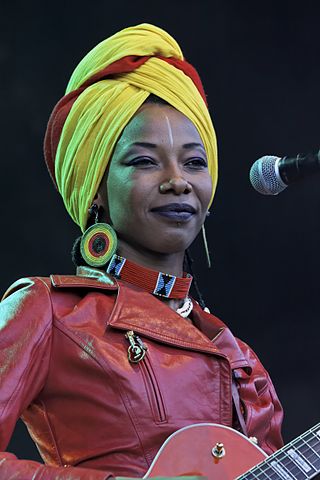Related Research Articles

Blues is a music genre and musical form that originated in the Deep South of the United States around the 1860s. Blues incorporated spirituals, work songs, field hollers, shouts, chants, and rhymed simple narrative ballads from the African-American culture. The blues form is ubiquitous in jazz, rhythm and blues, and rock and roll, and is characterized by the call-and-response pattern, the blues scale, and specific chord progressions, of which the twelve-bar blues is the most common. Blue notes, usually thirds, fifths or sevenths flattened in pitch, are also an essential part of the sound. Blues shuffles or walking bass reinforce the trance-like rhythm and form a repetitive effect known as the groove.

A record producer is a music recording project's overall supervisor whose responsibilities can involve a range of creative and technical leadership roles. Typically the job involves hands-on oversight of recording sessions: ensuring artists deliver acceptable and quality performances, supervising the technical engineering of the recording, and coordinating the production team and process. The producer's involvement in a musical project can vary in depth and scope. Sometimes in popular genres the producer may create the recording's entire sound and structure. However, in classical music recording, for example, the producer serves as more of a liaison between the conductor and the engineering team. The role is often likened to that of a film director though there are important differences. It is distinct from the role of an executive producer, who is mostly involved in the recording project on an administrative level, and from the audio engineer who operates the recording technology.

Thomas Isidore Noël Sankara was a Burkinabè military officer, Marxist revolutionary and Pan-Africanist who served as President of Burkina Faso from his coup in 1983 to his assassination in 1987. He is viewed by supporters as a charismatic and iconic figure of the revolution.

The balafon is a gourd-resonated xylophone, a type of struck idiophone. It is closely associated with the neighbouring Mandé, Senoufo and Gur peoples of West Africa, particularly the Guinean branch of the Mandinka ethnic group, but is now found across West Africa from Guinea to Mali. Its common name, balafon, is likely a European coinage combining its Mandinka name ߓߟߊ bala with the word ߝߐ߲ fôn 'to speak' or the Greek root phono.

The music of Mali is, like that of most African nations, ethnically diverse, but one influence predominates: that of the ancient Mali Empire of the Mandinka. Mande people make up around 50% of Mali's population; other ethnic groups include the Fula (17%), Gur-speakers 12%, Songhai people (6%), Tuareg and Moors (10%).

Oumou Sangaré is a Grammy Award-winning Malian Wassoulou musician of Fulani or Fula descent. She is often referred to as "The Songbird of Wassoulou". Wassoulou is a historical region south of the Niger River, where the music descends from age-old traditional song, often accompanied by a calabash.

Wassoulou is a genre of West African popular music named for the Wassoulou cultural area.

Kandia Kouyaté is a Malian jelimuso and kora player; she has earned the prestigious title of ngara, and is sometimes called La dangereuse and La grande vedette malienne. Kouyaté's dense, emotional, hypnotic manner of singing and her lyrical talents have earned huge acclaim in Mali, though she remained relatively little known outside Africa, due to extremely limited availability of her recordings. Her home town of Kita is known for love songs, which form a large part of Kouyaté's repertoire. She also sings praise songs.

Rokia Traoré is a Malian-born singer, songwriter and guitarist.
Djelimady Tounkara is a Malian musician and one of the foremost guitarists in Africa.

Habib Koité is a Malian musician, singer, songwriter and griot based in Mali. His band, Bamada, was a supergroup of West African musicians, which included Kélétigui Diabaté on balafon.

Sona Jobarteh is a Gambian multi-instrumentalist, singer and composer. She is from one of the five principal kora-playing griot families of West Africa, and is the first female professional kora player to come from a griot family. She is the cousin of the celebrated kora player Toumani Diabate, and is the sister of the diaspora kora player Tunde Jegede.

The ngoni is a string instrument and a traditional West African guitar. Its body is made of wood or calabash with dried animal skin head stretched over it. The ngoni, which can produce fast melodies, appears to be closely related to the akonting and the xalam. This is called a jeli ngoni as it is played by griots at celebrations and special occasions in traditional songs called fasas in Mandingo. Another larger type, believed to have originated among the donso is called the donso ngoni. This is still largely reserved for ceremonial purposes. The donso ngoni, or "hunter's harp," has six strings. It is often accompanies singing along with the karagnan, a serrated metal tube scraped with a metal stick. The donso ngoni was mentioned by Richard Jobson in the 1620s, describing it as the most commonly used instrument in the Gambia. He described it as an instrument with a great gourd for a belly at the bottom of a long neck with six strings.
Lucy Durán is a British ethnomusicologist, record producer and radio presenter. In the 1980s, Durán worked as a curator at the British Library National Sound Archive. She joined SOAS University of London in 1993, and is Professor of Music with special reference to Africa and Cuba, in the School of Arts. She is the daughter of Spanish composer and civil war veteran Gustavo Durán and the sister of poet Jane Duran and author Cheli Duran.

"Down to Zero" is a 1976 song by British singer-songwriter Joan Armatrading. It features pedal steel guitar by B. J. Cole and drums by Kenney Jones of the Faces.
Mamadou Sidiki Diabaté is a prominent Mandé kora player and jeli from Bamako, Mali. He is the 71st generation of kora players in his family and a son to Sidiki Diabaté.

Fatoumata Diawara is a Malian singer-songwriter currently living in France.
Bako Dagnon was a Malian griot singer. She is considered to be a popular representative of Mandinka culture and has released several records in local languages.
Awesome Tapes From Africa is a record label and website operated by Brian Shimkovitz, based in Los Angeles, California. The site was founded in 2006 in Brooklyn, New York.
Ko Sira is an album by the Malian wassalou singer Oumou Sangaré, released in 1993. It was originally issued independently as Bi Furu.
References
- 1 2 3 Ulman, Eugene (22 January 2021). "Music reviews: Glen Hansard, Reijseger/Fraanje/Sylla and more". The Sydney Morning Herald . Retrieved 1 February 2021.
- ↑ Stewart, Julia (2012). Stewart's Quotable African Women. Penguin Random House South Africa. p. 148. ISBN 9780143027119.
- 1 2 Spice, Anton (5 August 2019). "Awesome Tapes From Africa to reissue Nahawa Doumbia's debut album". The Vinyl Factory . Retrieved 1 February 2021.
- ↑ Charry, Eric (2000). Mande Music: Traditional and Modern Music of the Maninka and Mandinka of Western Africa. Chicago Studies in Ethnomusicology. U of Chicago P. p. 79. ISBN 9780226101620.
- ↑ Tenaille, Frank (2002). Music is the Weapon of the Future: Fifty Years of African Popular Music. Translated by Toussaint, Stephen; Sandrine, Hope. Chicago Review Press. pp. 135–36, 141. ISBN 9781556524509.
- ↑ O'Brien, Lucy (2003). She Bop II: The Definitive History of Women in Rock, Pop and Soul. A&C Black. p. 352. ISBN 9780826435293.
- ↑ Peterson, Brian J. (2021). Thomas Sankara: A Revolutionary in Cold War Africa. Indiana UP. p. 298. ISBN 9780253053763.